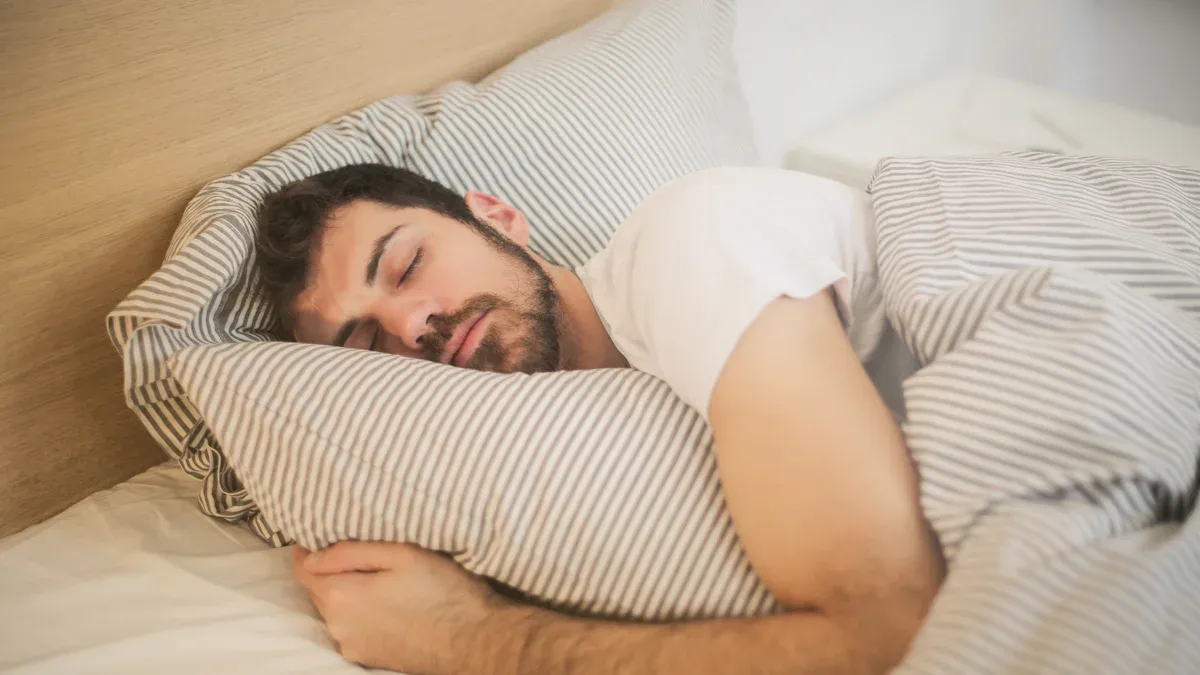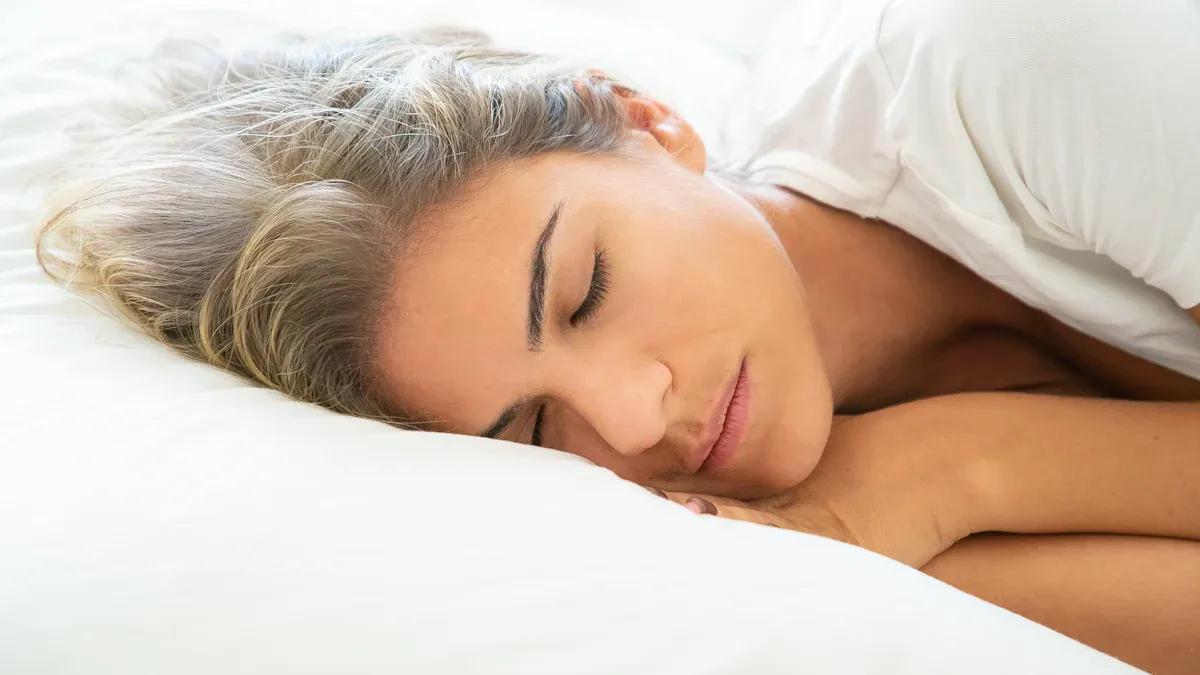
Simple changes in your daily habits can help you sleep better. You can also wake up with more energy. Many people have trouble sleeping well. Look at these numbers:
|
Statistic Description |
Percentage / Number |
|---|---|
|
Adults describing their sleep as ‘fair' or ‘poor' |
|
|
Adults not regularly getting recommended uninterrupted sleep |
About 1 in 3 (approx. 84 million) |
If you want better light sleep, start by watching your sleep patterns. Devices like the VERTU Aura Ring can help you track your sleep. They show what is light sleep and help you sleep better each night.
Key Takeaways
-
Make your bedroom cool, dark, and quiet. This helps your body relax. It can make your sleep better.
-
Go to bed and wake up at the same time every day. This helps your body get used to sleeping well.
-
Do not have caffeine or big meals late in the day. These things can make it hard to sleep.
-
Do calm things before bed, like stretching or reading. This helps your mind and body get ready to rest.
-
Use devices like the VERTU Aura Ring to track your sleep. This helps you see your sleep habits and make good changes.
What Is Light Sleep
Have you ever wondered what is light sleep and why it matters so much? When you drift off at night, your body moves through different sleep stages. What is light sleep? It is the first stage of non-rapid eye movement (NREM) sleep. During this time, you start to relax, but you can still wake up easily if you hear a noise or see a light. Your brain activity changes, showing a mix between being awake and falling into deeper sleep. What is light sleep? It is a transition zone, helping your body get ready for the deeper, more restful stages that come later.
What is light sleep for most people? In a typical night, you spend about half of your sleep time in this stage. For example, if you sleep for eight hours, you might spend four to five hours in light sleep. What is light sleep doing for you during this time? It helps your body and mind slow down, so you can rest and recover.
Why Light Sleep Matters
You might think only deep sleep is important, but what is light sleep doing for your health? During this stage, your heart rate and blood pressure drop, giving your heart a break. Your body starts to repair itself, releasing growth hormones and fixing cells. Take a look at what happens in the two main parts of light sleep:
|
Physiological Function |
NREM Stage 1 (N1) |
NREM Stage 2 (N2) |
|---|---|---|
|
Sleep phase |
Transition |
Deeper relaxation |
|
Heart rate |
Reduced |
Slows down |
|
Brain waves |
Alpha/theta |
Theta/spindles |
|
Awareness |
Easy to wake |
Less aware |
What is light sleep also doing for your mind? It helps you process memories and learn new things. If you do not get enough, you may feel tired, moody, or have trouble paying attention the next day.
Signs of Poor Light Sleep
How do you know if you are not getting enough light sleep? Watch for these signs:
-
You have trouble falling asleep or it takes longer than 30 minutes.
-
You wake up often during the night.
-
You notice mood swings or feel irritable.
-
You have trouble focusing at school or work.
-
You get headaches or feel tired even after a full night in bed.
Tip: If you notice these signs often, try tracking your sleep patterns. This can help you spot problems and find ways to improve your rest.
Bedroom Comfort

Cool, Dark, and Quiet
You want your bedroom to feel like a cozy retreat. The right sleep environment helps your body relax and makes it easier to fall asleep. Experts say the best bedroom temperature is between 60 and 67 degrees Fahrenheit. This cool range helps your body lower its core temperature, which is important for falling asleep and staying asleep. If your room feels too warm or too cold, you might wake up more often or have trouble getting back to sleep.
Light and noise also play a big role in how well you sleep. Even small amounts of light from streetlights or screens can make it harder for your brain to rest. Noise, like traffic or loud neighbors, can wake you up or keep you in lighter sleep stages. Try blackout curtains and earplugs if you live in a noisy area. Many people find that a white noise machine or a fan helps block out sounds.
Here’s a quick look at how different factors in your bedroom affect sleep:
|
Environmental Factor |
Impact on Sleep Quality |
|---|---|
|
Light Exposure |
Makes it harder to fall asleep and stay asleep. |
|
Noise Levels |
Causes you to wake up more and spend less time in deep sleep. |
|
Temperature |
A cool room (60–67°F) helps you fall asleep faster and sleep better. |
|
Mattress and Bedding Comfort |
Supports your body and keeps you comfortable all night. |
|
Cleanliness and Allergens |
Reduces sneezing and stuffy noses that can wake you up. |
|
Scents |
Lavender and other calming scents may help you relax and sleep well. |
Tip: Keep your room dark, quiet, and cool for the best chance at good quality sleep.
Supportive Mattress and Bedding
Your bed should feel comfortable and supportive. A mattress that fits your needs can make a big difference. Studies show that mid-firm mattresses help reduce back pain and improve sleep for most people. If your mattress is old or saggy, you might wake up sore or tired. Memory foam and air-adjustable mattresses can also help by spreading your weight evenly and supporting your spine.
Bedding matters too. Soft, breathable sheets keep you cool and cozy. Clean your bedding often to keep dust and allergens away. Pillows should support your neck and head without making you feel stiff.
-
Choose a mattress that feels right for your body.
-
Try different pillows to find the best fit.
-
Wash your sheets and pillowcases every week.
-
Replace your mattress every 7–10 years for the best support.
A comfortable bed and a clean sleep environment help you wake up feeling refreshed and ready for the day.
Minimize Disruptions
Block Out Light and Noise
You want your bedroom to feel peaceful at night. Light and noise are two of the biggest things that can wake you up or keep you from falling into deeper sleep. Even small sounds or a little bit of light can pull you out of light sleep and make you feel tired in the morning.
Here are some simple ways to block out light and noise:
-
Hang blackout curtains to keep streetlights and early sunlight out. These curtains also help absorb sound, making your room quieter.
-
Use thick curtains or heavy drapes to reduce noise from outside and inside your home.
-
Try earplugs if you live in a noisy area. Soft, clean earplugs can block out sounds like traffic or snoring.
-
Add a white noise machine to your room. It makes a steady sound that covers up sudden noises, helping you relax.
-
Choose pink or brown noise if you prefer sounds like rain or waterfalls. These can help slow your brain waves and improve deep sleep.
-
Place rugs on the floor and seal doors with noise-absorbent strips to cut down on echoes and outside noise.
-
For extra soundproofing, consider soundproof windows or doors if noise is a big problem.
Tip: A quiet, dark room helps your body stay in restful sleep longer. Try combining a few of these ideas for the best results.
Make Your Room Screen-Free
Screens can sneakily steal your sleep. Phones, tablets, and TVs all give off blue light, which tells your brain to stay awake. Watching videos or scrolling through social media before bed can also make your mind too active to relax.
Try these steps to make your room screen-free:
-
Remove all electronic devices from your bedroom, including TVs, tablets, and laptops.
-
Charge your phone outside your room or set it to “Do Not Disturb” mode.
-
Turn off screens at least one hour before bedtime to help your body get sleepy.
-
Create a calming bedtime routine, like reading a book or listening to soft music.
-
Use a regular alarm clock instead of your phone to wake up in the morning.
When you keep screens out of your bedroom, you fall asleep faster and wake up feeling more refreshed. You also avoid the temptation to stay up late watching videos or playing games. A screen-free room supports a healthy sleep environment and helps you build better sleep habits.
Sleep Ritual
Calming Activities Before Bed
You can set yourself up for better sleep by creating a relaxing routine before bedtime. A good sleep ritual helps your body know it is time to wind down. Try these calming activities to relax and clear your mind:
-
Do gentle stretches or yoga. These movements help your muscles relax and lower stress.
-
Try deep breathing exercises. Slow, steady breaths trigger your body’s relaxation response and make you feel calm.
-
Practice meditation or visualization. Imagine a peaceful place or focus on your breath to quiet your thoughts.
-
Listen to soft music or calming sounds. Nature sounds or gentle tunes can help you drift off.
-
Enjoy creative hobbies like drawing, journaling, or reading a book. These activities shift your focus away from worries.
You might also like light activities such as gardening or art therapy. These can boost your mood and help you feel ready for bed. Studies show that moderate exercise during the day, like walking or tai chi, can help you fall asleep faster and sleep longer. Just remember to keep workouts light in the evening.
Tip: A relaxing routine before bed can lower anxiety and help you sleep better.
Consistent Bedtime Routine
Keeping a regular sleep schedule is one of the best ways to improve your sleep. When you go to bed and wake up at the same times every day, your body learns when to feel sleepy and when to wake up. This makes it easier to fall asleep and stay asleep.
|
Benefit |
What You’ll Notice |
|---|---|
|
Fall asleep faster |
Less tossing and turning |
|
Fewer night wakings |
Sleep feels deeper and more restful |
|
Better mood in the morning |
Wake up feeling refreshed |
|
Less bedtime stress |
Bedtime feels easier and calmer |
A consistent sleep schedule helps you build strong sleep habits. Try to keep your bedtime and wake-up time the same, even on weekends. This regular sleep schedule trains your body’s clock and supports better sleep quality.
You can start your ritual with a warm bath, reading, or quiet time. These simple steps signal your brain that it is time to slow down. Over time, your body will expect these cues and respond by getting sleepy at the right time.
Note: Sticking to consistent sleep times helps you get the most out of your sleep and feel your best each day.
Getting Better Sleep with Daily Habits
Morning Sunlight Exposure
You can set yourself up for a better night's sleep by stepping outside in the morning. When you get sunlight soon after waking, your brain gets a strong signal to start the day. This light tells your body’s internal clock, called the circadian rhythm, that it’s time to be alert. Your brain then lowers melatonin, the hormone that makes you sleepy, and boosts cortisol, which helps you feel awake and focused.
Here’s what happens when you soak up morning sunlight:
-
Your circadian rhythm gets a clear signal to start the day.
-
Melatonin drops, so you feel less sleepy.
-
Cortisol rises, making you alert and ready.
-
Serotonin increases, which lifts your mood and helps you think clearly.
-
You fall asleep earlier and sleep longer at night.
Even on cloudy days, try to spend 15–20 minutes outside without sunglasses. The blue and white light in the morning is the best for your circadian rhythm. Morning sunlight works like natural light therapy, helping you improve sleep quality and feel more refreshed.
Tip: Make morning sunlight part of your regular sleep schedule. It helps your body’s rhythm stay on track, so you can sleep better at night.
Stay Active
Moving your body every day is another simple way to improve sleep quality. When you exercise regularly, you help your circadian rhythm stay steady. Moderate activities like walking, biking, or even Tai Chi can help you fall asleep faster and wake up less during the night.
Check out these benefits of staying active:
-
You improve sleep by reducing the time it takes to fall asleep.
-
You wake up less often at night.
-
You get more good sleep and feel rested in the morning.
-
You lower your risk of sleep problems.
The World Health Organization suggests 150 minutes of moderate exercise each week. If you keep a regular sleep schedule and exercise regularly, you support your body’s natural rhythm and improve sleep quality. Just remember, too much or too little activity can make sleep harder, so aim for a healthy balance.
Note: Try to finish your exercise a few hours before bedtime. This gives your body time to relax and get ready for good sleep.
Improve Sleep with Smart Choices
Limit Caffeine and Alcohol
You might love a cup of coffee in the afternoon or a soda with dinner, but caffeine can sneak into your sleep and make it harder to rest. Even if you drink caffeine six hours before bedtime, it can still affect how long it takes you to fall asleep and how much light sleep you get. Take a look at this table to see how caffeine changes your sleep:
|
Caffeine Time Before Bed |
Extra Time to Fall Asleep (minutes) |
Less Light Sleep (minutes) |
|---|---|---|
|
0 hours |
+22.4 |
-40.6 |
|
3 hours |
+17.2 |
-40.6 |
|
6 hours |
+24.1 |
-44.1 |
Caffeine can also cut your total sleep by over an hour and make you wake up more during the night. If you want to improve sleep quality, try to avoid caffeine after lunch.
Alcohol might make you feel sleepy at first, but it does not help you improve your sleep. Here’s what happens when you drink alcohol before bed:
-
You fall asleep quickly, but your sleep gets lighter and more broken later in the night.
-
You wake up more often and feel less rested in the morning.
-
Your sleep feels less refreshing, even if you sleep for the same amount of time.
Tip: If you want to wake up feeling good, skip the nightcap and choose water or herbal tea instead.
Avoid Heavy Meals Late
Eating a big meal right before bed can make it tough to get good sleep. Heavy or high-fat foods slow down your digestion and can cause you to toss and turn. Here’s what late-night eating can do:
-
Makes it harder to fall asleep and lowers sleep efficiency.
-
Increases the number of times you wake up at night.
-
Reduces REM sleep, which is important for feeling refreshed.
-
Can lead to more daytime sleepiness.
Women may notice even more trouble with sleep after eating late, especially if the meal is high in fat or calories. Try to finish your last meal at least two to three hours before bedtime. If you get hungry, choose a light snack like yogurt or a banana.
Note: Smart choices in the evening can improve your sleep and help you feel more energized the next day.
Sleep Tracking

Using the VERTU Aura Ring
If you want to take your sleep to the next level, try tracking it with the VERTU Aura Ring. This smart ring is more than just a piece of jewelry. It uses advanced AI and tiny sensors to watch over your sleep quality, heart rate, blood oxygen, and even your body temperature. The Aura Ring fits comfortably on your finger, so you can wear it all night without even noticing it’s there.
The ring gives you easy-to-read reports about your sleep. You can see how much time you spend in each sleep stage, including light sleep and deep sleep. The Aura Ring also shows how your habits—like when you go to bed, how cool your room is, or if you had caffeine—affect your sleep quality. You get clear graphs and tips that help you spot patterns and make changes. The ring’s beautiful design and featherlight feel mean you can wear it all day, not just at night.
Tip: Use the Aura Ring to track your sleep for a week. You might notice that small changes, like moving your bedtime or skipping late-night snacks, help you get better rest.
Review and Adjust
Once you start tracking your sleep, you can look for trends. Many people find that changing their sleep schedule, like going to bed earlier, helps them feel more energized. You might see that your bedroom temperature or late exercise affects your sleep quality. The Aura Ring makes it easy to review your data and try new sleep tips.
Wearable trackers like the Aura Ring give you the power to understand your sleep. You can set goals, follow your progress, and get advice that fits your lifestyle. Over time, these small changes add up, helping you build habits for quality sleep every night.
When to Seek Help
Recognize Sleep Disorders
Sometimes, you might notice that your trouble sleeping does not go away, even after trying different tips. If you keep having restless nights or feel tired every day, it could be a sign of a sleep disorder. You should watch for these signs:
-
You wake up gasping or choking.
-
You have strong urges to move your legs, especially at night.
-
You act out dreams or move a lot while sleeping.
-
You feel sleepy during the day, even after a full night’s rest.
-
You have trouble falling asleep or staying asleep for weeks.
-
You feel anxious or your mood changes often.
Doctors use different tools to find out what is causing your sleep problems. They may ask about your sleep habits, use sleep diaries, or give you questionnaires. Sometimes, they use special tests like polysomnography (a sleep study) or actigraphy (a wrist device that tracks movement). For some sleep disorders, doctors may check your iron levels or do a neurological exam.
If you notice these signs often, it is important to pay attention. Sleep disorders can affect your health in many ways.
Consult a Specialist
If you have tried changing your habits but still struggle with sleep, it may be time to talk to a healthcare provider or sleep specialist. They can help you find out if you have a sleep disorder and suggest the best treatment. Untreated sleep disorders can lead to serious health problems over time. These include high blood pressure, heart disease, diabetes, and even problems with memory or mood. You may also feel more tired during the day, have less energy, or feel more anxiety.
A sleep specialist can guide you through the right tests and help you get the care you need. Getting help early can protect your health and improve your quality of life. Remember, you do not have to face sleep problems alone. Support is available, and you can take steps to feel better and sleep well again.
You can boost your energy and mood by building steady sleep habits and making your bedroom a calm, cool place. Studies show that keeping a regular bedtime, using blackout curtains, and relaxing before sleep all help you get more quality sleep. Even small changes, like moving more or tracking your sleep with the VERTU Aura Ring, add up over time.
Start with one tip today. You’ll feel the difference tomorrow!
FAQ
How can I tell if I am getting enough light sleep?
You can check how you feel in the morning. If you wake up refreshed and alert, you likely get enough light sleep. Sleep trackers like the VERTU Aura Ring can also show your sleep stages each night.
Can I improve my light sleep without special devices?
Yes! You can make your room cool and dark, keep a regular bedtime, and avoid caffeine late in the day. These simple changes help most people sleep better.
What makes the VERTU Aura Ring different from other trackers?
The Aura Ring blends luxury design with advanced AI health tracking. It feels light and comfortable. You get clear, easy-to-read reports and personalized tips to help you improve your sleep and health.
How long does it take to see better sleep after changing habits?
Most people notice better sleep in a few days to a week. Small changes, like going to bed at the same time or getting morning sunlight, can make a big difference quickly.
Is it normal to wake up during light sleep?
Yes, it is normal. Light sleep is a stage where you wake up easily. If you fall back asleep quickly and feel rested in the morning, you do not need to worry.







